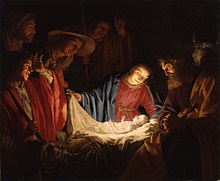
A manger or trough is a rack for fodder, or a structure or feeder used to hold food for animals. The word comes from the Old French mangier (meaning "to eat"), from Latin mandere (meaning "to chew").
Mangers are mostly used in livestock raising and generally found at stables and farmhouses. They are also used to feed wild animals, e.g., in nature reserves.
A similar trough providing drinking water for domestic or non-domestic animals is a watering trough and may be part of a larger watering structure called abreuvoir.
The manger in Christianity
The manger is associated with nativity scenes where Mary and Joseph, forced by necessity to stay in a room for animals instead of a guest room, used a manger as a makeshift crib for the Baby Jesus. (Greek: φάτνη phatnē; Luke 2:7).
Gallery
-
 18th century limestone mangers at The Devil's Farmhouse in Mellieha, Malta.
18th century limestone mangers at The Devil's Farmhouse in Mellieha, Malta.
-
 Donkey eating apples from a steel trough
Donkey eating apples from a steel trough
-
 Nativity at Night by Geertgen tot Sint Jans, c. 1490.
Nativity at Night by Geertgen tot Sint Jans, c. 1490.
See also
- "Away in a Manger", a Christmas carol
- Bird feeder
- The Dog in the Manger, a metaphor
References
- Harper, Douglas. "manger". Online Etymology Dictionary. Retrieved 9 June 2020.
- Mahoney, Leonardo (1996). 5,000 years of Architecture in Malta. Malta: Valletta Publishing. Format. p. 123-124. ISBN 9990958157. ISBN 9789990958157
- William, Francis Dawson (1902). Christmas: Its Origin and Associations. E. Stock. Retrieved 2014-12-25.
- "I know Jesus was born in a manger, but why is that important and what does it mean?". Archdiocese of Saint Paul and Minneapolis. 2021-11-06. Retrieved 2022-11-02.
External links
 Media related to Feeding troughs at Wikimedia Commons
Media related to Feeding troughs at Wikimedia Commons The dictionary definition of manger at Wiktionary
The dictionary definition of manger at Wiktionary
| Nativity of Jesus | ||||||||
|---|---|---|---|---|---|---|---|---|
| People |
|  | ||||||
| Place | ||||||||
| Gifts of the Magi | ||||||||
| Narratives |
| |||||||
| Related | ||||||||
| In culture | ||||||||
| Remembrances | ||||||||